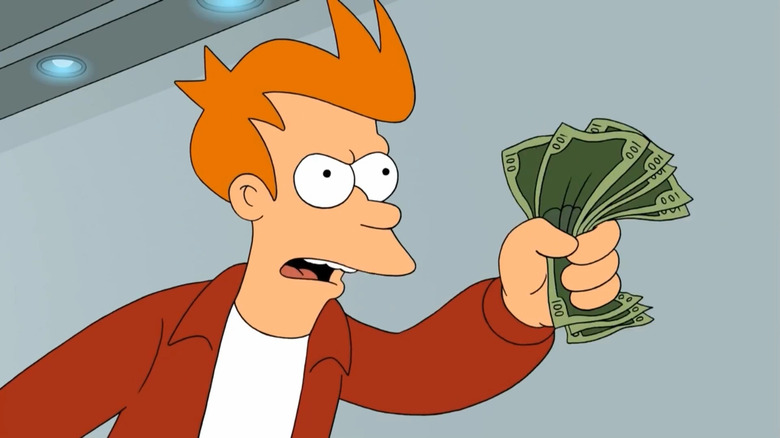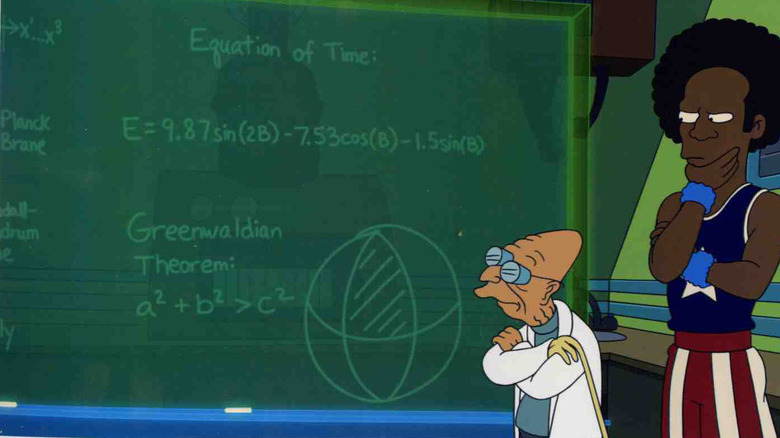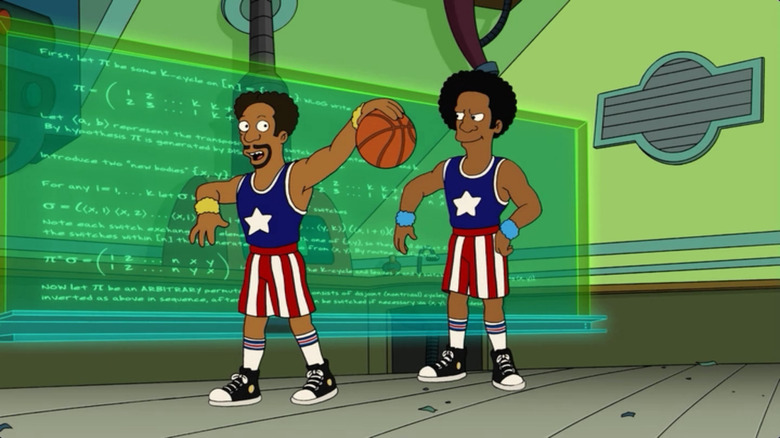Every Joke In Futurama Followed One Important Writers Room Rule
Matt Groening's and David X. Cohen's "Futurama" is a show made by nerds, for nerds. While the show is rife with low gags — one of the main characters is a drunken robot who frequently invites his flesh-wrapped compatriots to bite his shiny metal ass — a highly educated mathematician might notice the many complicated math proofs in the background. In Dwayne Carey-Hill's 2007 "Futurama" movie "Bender's Big Score," Professor Farnsworth (Billy West) stands at a chalkboard to determine whether or not time travel is possible. He writes E = 9.87sin(2B) – 7.53cos(B) – 1.5sin(B) only to lamentably admit that the equation cannot be solved. Luckily, a group of visiting physicists take a crack at it, and do find a solution, as they use a "variation of parameters and expand the Wronskian." The visiting physicists, by the way, are the Harlem Globetrotters.
While the general absurdity of the scene — that the Globetrotters are an alien species that can solve immensely complicated math problems — won't be lost on a general audience, it's the actual math that will make a select few roar. Cohen is on record with his pride in the fact that "Futurama" is a show that can appeal to physics grad students. If a writer can come to Cohen with a particularly oblique math reference, Cohen will happily include it. The fact that Al Gore (a semi-regular on the show) is driving a taxi cab with the ID number 87,539,319 on the roof is significant. Other little scientific references make their way onto the show all the time. When Fry (also West) tries to disguise himself as a robot to fool another robot, he invites a robotic interrogator to ask him things only a robot would know. A cross-examining they refer to as a "reverse Turing test."
Math-Ray vision
Cohen, a math club champion from high school, talked about his obsessions with Wired Magazine back in 2007, eager to share how geeky he would let the show be. As a math aficionado, Cohen resented the way mathematicians were depicted on TV, tired of their Olympian, wizard-like qualities:
"As a general rule, I hate watching TV or movies with mathematicians in it. It never rings true. They're portrayed as magic beings. There's an implication that a normal person can't do math because they don't have this magic power, which is very discouraging. You don't have to have Math-Ray Vision."
Cohen does have a point. Generally speaking, an average person might be fine admitting that they have no head for numbers, when they would never admit to being unable to read, drive, or kiss. To assure that "Futurama" be particularly geek-friendly, Cohen hired a team of writers with advanced degrees who were just as eager to make mathematics jokes along with him. Cohen has a master's degree in theoretical computer science from Berkeley. Writer/producer Ken Keeler has a PhD in applied math. Writer Stewart Burns has a master's in math. Also in the writer's room is a PhD is chemistry, a philosophy master, and a computer science master. Eggheads rule the roost.
Indeed, the nerdy appeal of the show was such that a special feature on a DVD was a math lecture:
"The lecture is by professor Sarah Greenwald of Appalachian State University. She discusses various mathematical references over the history of the series, and her talk is intercut with clips from the episodes she refers to."
F*** you if you don't know BASIC
The rule that Cohen likes to abide by in the writers' room is what he called the 1% rule. In brief, jokes are acceptable, even if they will only be understood by 1% of the viewing audience. The general thrust and flow of the scene must remain in tact, and a general audience (that is: an audience without advanced math degrees) must still be able to get a titter out of it, but quick references to Fermat's theorem are also permitted.
In the Wired interview, Cohen recalled a proposed line of dialogue for the episode "Kif Gets Knocked Up a Notch," wherein a computer programmer, creating a holographic simulation of a person, declares they are realized "using four million lines of BASIC." This is a joke that might be understood by people over 40 who used to do their own rudimentary computer programming on home computers in the 1980s, and are familiar with the BASIC programming language. Cohen recalls one writer expressing concern that no one watching would really understand that joke. According to Cohen, one of the show's producer, Eric Kaplan, responded with a robust "F*** 'em!" The show is more about cult passwords and winks for science nerds than it is about four-quadrant appeal. Said Cohen:
"As long as it doesn't derail the enjoyment of the 99 percent, 'Futurama' will make a joke tailored to the nerdiest 1% of its audience. That 1 percent becomes a fan for life."
"Futurama" is set to be rebooted — again — on Hulu, sometime in 2023.


